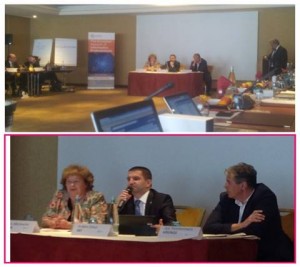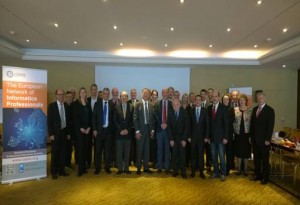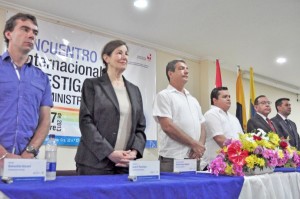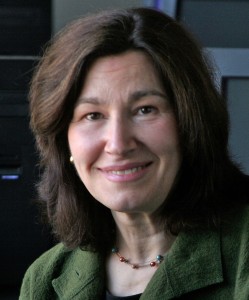Last week, Jane Fountain presented the results of a broad study of cross-agency collaboration at the annual plenary meeting of the Administrative Conference of the United States, an independent federal agency. The final report, The GPRA Modernization Act of 2010: Examining Constraints To, and Providing Tools For, Cross-Agency Collaboration brings together guidance and recommendations for public managers, examines the early implementation of some of the provisions of the Government Performance and Results Act Modernization Act of 2010, and highlights four case studies of successful, important cross-agency collaboration. I’m immensely grateful to current and former government officials and other experts who gave generously of their time and knowledge to teach me more of the inner workings of cross-agency collaboration.
The case studies in the report are meant to illustrate concretely the complexity of cross-agency collaboration and, in most cases, the long period of development required for public managers and others to build shared goals, language, methods and processes. The case studies demonstrate innovative and impressive cross-agency projects.
The National Export Initiative, one of the administration’s first set of cross-agency priority, or CAP, goals is meant to double U.S. exports by the end of 2014. The effort brings together about 20 different departments and agencies responsible for trade policy, negotiations, funding and other resources, and export promotion. The initiative builds on the Trade Policy Coordinating Committee, established by Congress in 1992, and strengthens its strategic focus and coherence.
Reducing veteran homelessness focuses on the “virtual agency” created by policy entrepreneurs at the U.S. Department of Housing and Urban Development, HUD, and the Veterans Administration, the VA, working with a constellation of state and local government agencies, NGOs and other partners. The HUD-VA Supportive Housing rental voucher program, an interagency program that actually began in 1991, is one of the core cross-agency vehicles to move veterans with a variety of physical and mental health needs out of chronic homelessness. Nineteen federal agencies comprise the U.S. Interagency Council on Homelessness (USICH). But local level collaboration is critical for implementation. The case describes the linkages from Washington to local level, community decision makers.
The Partnership for Sustainable Communities is a collaboration among three federal agencies designed to reconceptualize policies and practices by coordinating those who work on affordable housing with those who focus on affordable transportation to produce solutions for communities that will help people live in proximity to jobs with the ability to choose affordable transportation. The U.S. Department of Transportation, the U.S. Department of Housing and Urban Development and the Environmental Protection Agency have worked together to build this cross-agency capacity. Here’s a brief video from the mayor of Bridgeport, Connecticut on the importance of the collaboration.
An expert at DOT said of this initiative:
One of the biggest [cross-agency projects] in the Obama Administration has been the Partnership for Sustainable Communities. This is clearly worth doing. We do a profound amount of transportation, housing, economic development, environmental planning and investment that is completely disconnected. We fail to capitalize on synergies and we spend way more money than we should and we don’t get the outcomes. That’s an area where the challenges [of cross-agency collaboration] are worth it.
Expedited Permitting and Review of Federal Infrastructure Projects is a case study that offers guidance to public managers and others on the cross-agency use of dashboards, rapid response teams, and interventions at the regional and local levels to push collaboration throughout agencies. Quoting from a presidential memorandum of August 2011, the project is meant to more fully leverage strategies such as “integrating planning and environmental reviews; coordinating multi-agency or multi-governmental reviews and approvals to run concurrently; setting clear schedules for completing steps in the environmental review and permitting process; and utilizing information technologies to inform the public about the progress of environmental reviews as well as the progress of Federal permitting and review processes.”
The background and recommendations in the report build on and expand previous research, including a more concise report titled Implementing Cross-Agency Collaboration: A Guide for Federal Managers, published by the IBM Center for the Business of Government.
The ACUS annual plenary discussion concerning the study were surprising, in a positive way, because agency general counsel and attorneys discussed how important it is to them to understand the components of cross-agency collaboration. Most public management researchers know little about the perspectives and role of agency general counsel and attorneys with respect to interagency collaboration. We need to know more. Some attorneys described how agency attorneys are thrown into complex negotiations across agencies, and multiple parties, having had no training or experience in these matters. The video of the plenary session discussion is useful for its recording of this discussion. ACUS also makes publicly available on its website the meetings, minutes and various reviews of the study and recommendations as these were carried out by the ACUS Committee on Administration and Management.
 Dr. Erdem Erkul, Regional National Plan Manager, Legal & Corporate Affairs, Middle East and Africa, Microsoft and a former NCDG Fellow, participated in the the 52nd CEPIS Council last weekend in Geneva.
Dr. Erdem Erkul, Regional National Plan Manager, Legal & Corporate Affairs, Middle East and Africa, Microsoft and a former NCDG Fellow, participated in the the 52nd CEPIS Council last weekend in Geneva.






